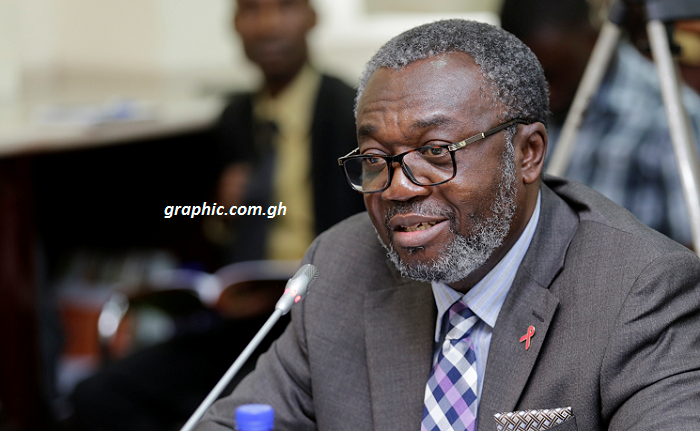
Report on ‘No bed syndrome’ will turn health care around — Dr Nsiah-Asare
The Director General of the Ghana Health Service (GHS), Dr Anthony Nsiah-Asare, says the report of the committee investigating the ‘no bed’ syndrome in hospitals can change the face of emergency health care.
According to him, the committee was expected to finalise its report yesterday and present it on Monday, July 9, 2018, after which he would also present it to Parliament by Wednesday, July 11, 2018.
In an interview with the Daily Graphic, the director general said the terms of reference given to the committee were so elaborate that their report was going to change how health facilities managed emergency situations and make it robust.
Six-member committee
A six-member committee was set up to investigate the death of a 70-year-old man, identified as Prince Acheampon, on Saturday, June 2, 2018 after he had been denied admission by seven hospitals because they claimed they had no beds.
After he had been sent to the C&J Medicare Hospital at Adabraka, the Korle Bu Polyclinic, the Greater Accra Regional Hospital (Ridge), Police Hospital, Trust Hospital, La Polyclinic, he finally reported to the LEKMA Hospital at Teshie where he died in his car.
Dr Nsiah-Asare said the committee, which had been working assiduously since it was formed, would help to address systems failure in emergency care.
TOR
The committee’s report will examine the current situation of the country’s ambulance system and recommend how to make the ambulance service work in the country.
It will also come out with how beds in emergency wards should be managed to ensure that at every point in time, there is an available bed to attend to emergency cases.
Dr Nsiah-Asare revealed that under normal circumstances, emergency wards must not admit patients for more than 24 hours, but that was not the situation in many hospitals.
Ideally, he said, patients in emergencies should be moved into regular wards after they had been stabilised or should be referred to the hospitals they were sent from to continue their recuperation.
However, he noted, due to laxity in the healthcare management in the country, people were made to stay in emergency care till they were discharged, creating a situation where others could not be admitted.
Dr Nsiah-Asare said the report would also determine whether the attitude of healthcare professionals was also to blame and as to what was responsible for such conduct or behaviour.
According to him, the ‘no bed’ syndrome in the country’s hospitals would end after the report of the committee was made public.
He stressed that under no circumstances should any staff in a health facility turn away a patient unless that patient had been examined by a medical officer in-charge.
Regions
Meanwhile, visits to a number of hospitals in Accra and other regions revealed that the lack of beds in public and quasi-government hospitals is undermining the capacity of hospitals to admit more patients.
The Korle Bu Teaching Hospital (KBTH), for instance, needs at least 500 additional beds to enable it to perform at maximum capacity.
The Public Relations Officer (PRO) of the hospital, Mr Mustapha Salifu, indicated that a very critical area in dire need of beds was the emergency ward.
Mr Salifu said for the hospital to maintain its accolade as the premier teaching and referral centre, it needed a minimum of 500 more beds to operate effectively.
According to him, the ‘no bed’ situation with hospitals in the country was because most hospital beds were broken and needed to be replaced.
Under normal circumstances, he explained, the hospital would have to replace its broken beds with money from internally generated funds, but that had not been possible because there was no money.
According to Mr Salifu, beds at the KBTH were replaced by the government under the auspices of the Ministry of Health (MoH) and sometimes also through assistance from philanthropists and non-governmental organisations.
However, for some time now, he said, that had not been forthcoming.
Cape Coast
From Cape Coast, Shirley Asiedu-Addo and Deborah Oluwamuyiwa report that even though the Cape Coast Teaching Hospital (CCTH) experiences congestion in the wards, it does not turn patients away.
The PRO of the hospital, Mr Frederick Yankah, said the facility had systems in place that ensured that the most critically ill patients were treated first.
“In extreme cases, the hospital refers patients to other health institutions,” he stated.
He said the hospital managed situations of congestion that came its way in a manner that did not affect delivery of health care, adding that it had not yet got to the point where it would have to turn patients away.
The Emergency Unit of the CCTH, he said, had 16 beds, four stretchers and two coat beds.
“We are on the average able to contain emergency cases on our hands with this number of beds. If there are too many cases, we discharge those who can go home without a problem and admit those in critical condition.
‘’In extreme cases, medics treat the sick and injured in ambulances or wheelchairs, but do not send them away,” he revealed.
The CCTH, the largest health facility in the Central Region, has a 120-bed capacity.
